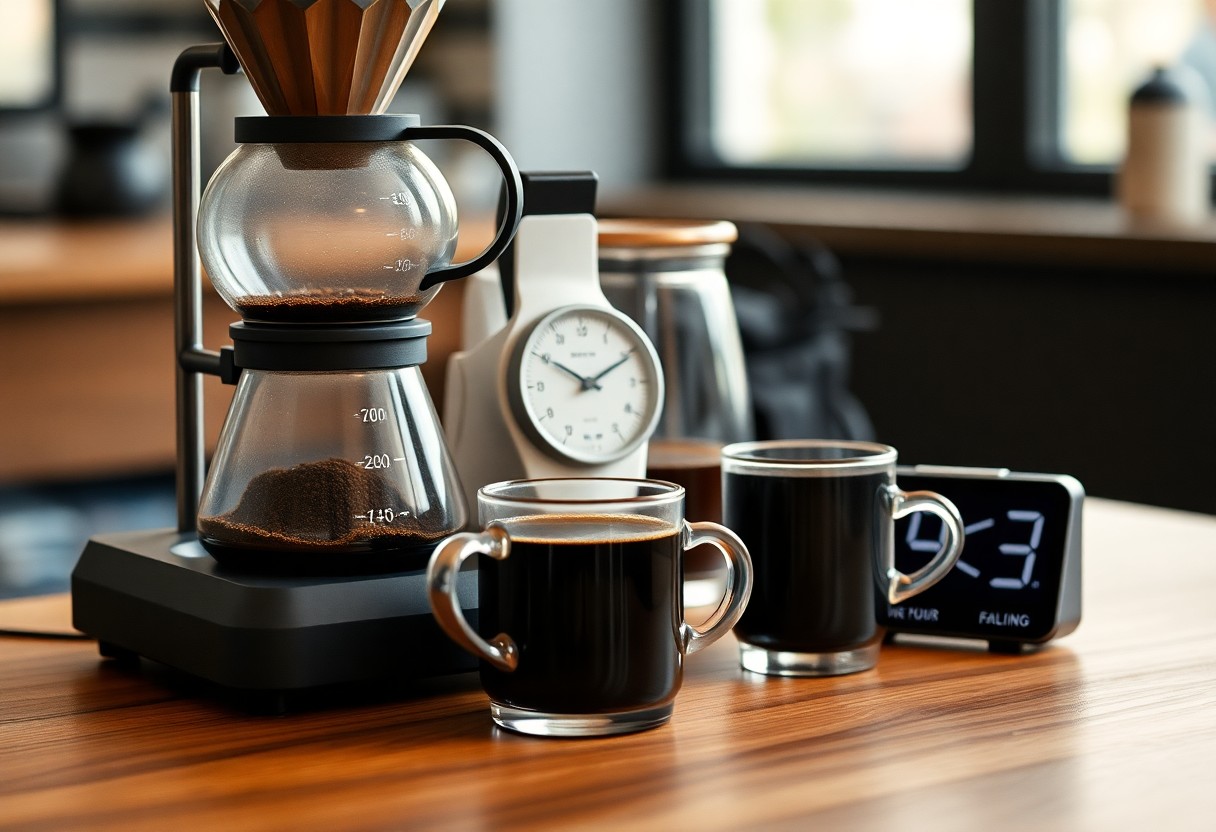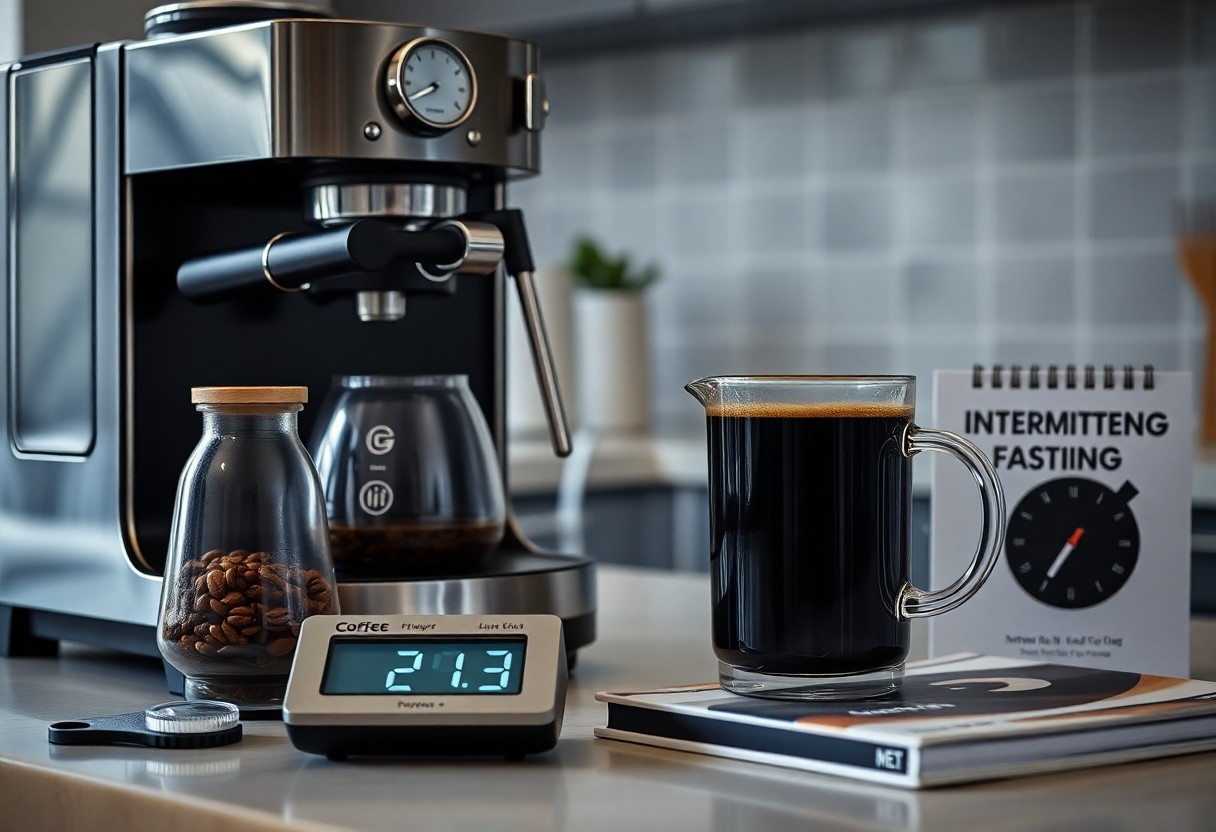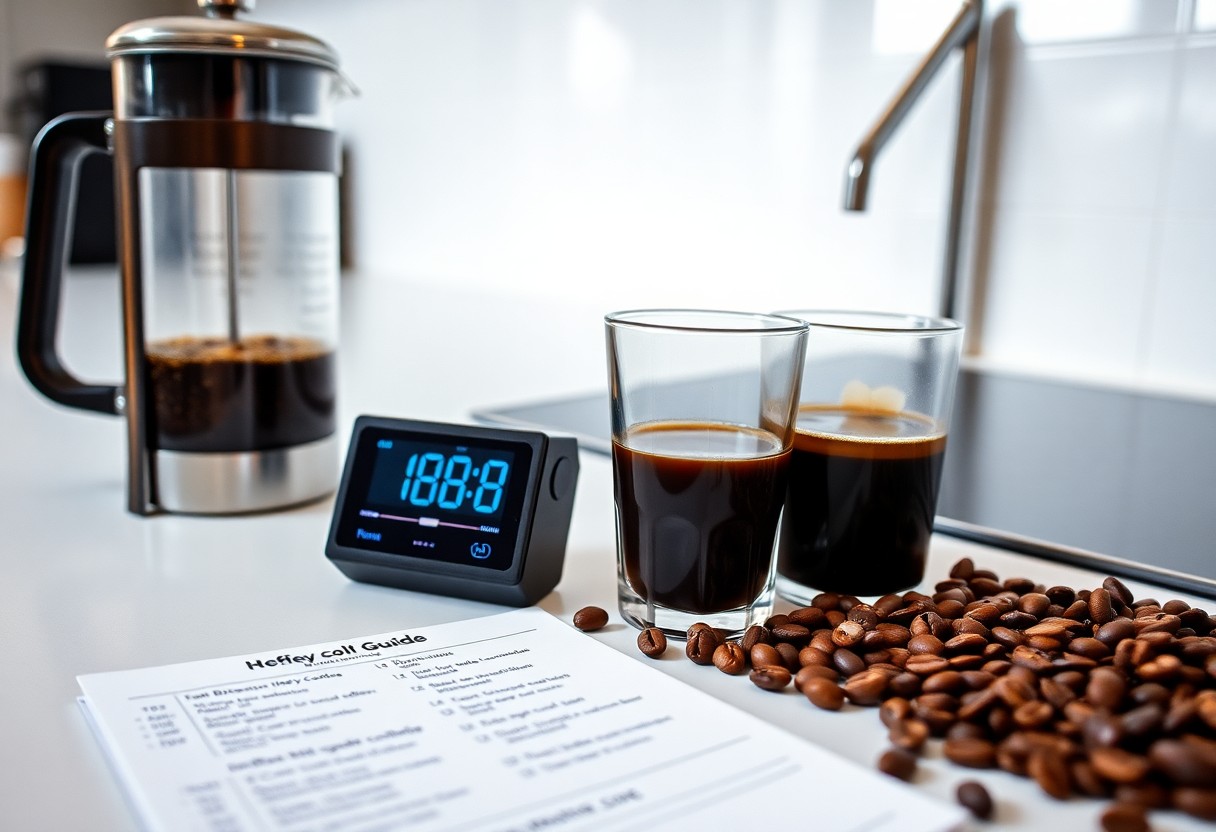You can enhance your intermittent fasting experience by brewing coffee in a way that aligns with your fasting goals. By focusing on high-quality, low-calorie options, you can enjoy a fulfilling beverage without breaking your fast. It’s imperative to choose the right beans and brewing methods that boost your metabolism while keeping you energized. In this guide, you’ll learn how to craft the perfect cup of coffee that complements your fasting routine and maximizes the benefits of your fasting period.
Key Takeaways:
- Opt for black coffee or coffee with minimal calorie additives to maintain the benefits of intermittent fasting.
- Consider brewing methods that extract rich flavors without adding extra calories, such as French press or pour-over.
- Be mindful of caffeine intake, as excessive consumption can affect sleep patterns and overall health during fasting periods.
Crafting the Perfect Brew: Ingredients and Ratios
Achieving the perfect cup of coffee during intermittent fasting involves careful selection of ingredients and balanced ratios. Start by focusing on high-quality coffee beans and pure water, ensuring a rich, flavorful brew that aligns with your fasting goals. Measure your coffee-to-water ratio precisely to extract optimal flavors without over-diluting your drink. Understanding the interplay between these elements can elevate your coffee experience while keeping it low-calorie and satisfying.
Choosing Your Coffee Beans: Roasts and Varietals
Selecting the right coffee beans is crucial for flavor and energy during your fasting window. Dark roasts offer a bold taste with lower acidity, while light roasts tend to be brighter and more fruity. Explore different varietals to discover unique flavors, like Ethiopian beans with floral notes or Colombian beans that provide a well-rounded taste. Ultimately, your choice will depend on personal preferences and how it complements your intermittent fasting routine.
The Science of Water: Quality, Temperature, and Ratios
Water quality significantly impacts the flavor of your coffee; always opt for filtered water to avoid chlorine or contaminants. Ideal brewing temperatures range from 195°F to 205°F, ensuring a smooth extraction without bitterness. Ratios matter too; a standard guideline is the 1:15 ratio of coffee to water, which can be adjusted based on taste preferences. Perfecting these elements will enhance your brew while keeping it fasting-friendly.
| Water Quality | Use filtered water to eliminate impurities. |
| Temperature | Optimal brewing temperature is between 195°F and 205°F. |
| Coffee-to-Water Ratio | A general guideline is 1:15. |
Using filtered water is vital since impurities can alter the taste profile of your coffee. For temperature, brewing between 195°F and 205°F fosters optimal extraction of flavors without resulting in bitterness or sour notes. Paying attention to your coffee-to-water ratio can significantly enhance your experience; adjust this based on your taste buds and the specific beans you’re using. A basic 1:15 ratio provides a balanced flavor, ensuring you enjoy each sip without unnecessary calories during your fasting period.

The Optimal Brewing Methods for Intermittent Fasting
Finding the right brewing method can enhance your coffee experience while adhering to intermittent fasting. Different techniques influence flavor, caffeine levels, and the caloric impact of your coffee. Focusing on options that minimize additional calories lets you enjoy your cup without breaking your fast. With several brewing styles available, options like French Press and Pour Over can help you strike the perfect balance between taste and health benefits without compromising your fasting goals.
French Press vs. Pour Over: Which Method Supports Fasting Best?
The French Press method allows for more oils and particles to remain in your coffee, resulting in a bolder flavor, but it also means higher caloric content from those oils. In contrast, the Pour Over technique filters out most of these oils, creating a cleaner cup with lower calories. If your main goal is to keep your coffee as low-calorie as possible while fasting, Pour Over is the ideal choice.
The Role of Brewing Time and Extraction in Low-Calorie Coffee
Brewing time plays a vital role in the extraction of flavors and compounds from coffee grounds. Shorter brewing times, typical of methods like Pour Over, lead to less oil being extracted. This results in a coffee that is lower in calories and better suited for those practicing intermittent fasting. On the other hand, longer brewing processes can cause over-extraction, releasing more bitter compounds and oils, adding unnecessary calories. Experimenting with time can help you find the perfect balance for your desired flavor profile without compromising your fast.
Enhancing Flavor Without Breaking Your Fast
Enjoying flavorful coffee while adhering to intermittent fasting principles is entirely achievable by opting for natural enhancers. You can amplify the taste of your brew without compromising your fast, as these add-ons generally contain negligible calories, so they won’t trigger insulin responses. By carefully selecting flavoring techniques, you ensure your coffee remains both satisfying and aligned with your fasting goals.
Natural Additives: Cinnamon, Vanilla, and Their Benefits
Cinnamon and vanilla are excellent natural additives that offer delightful flavors without the calories. Adding a dash of cinnamon not only elevates the taste of your coffee but also introduces health benefits such as improved insulin sensitivity and lower blood sugar levels. Vanilla, on the other hand, lends a sweet aroma and flavor profile; it can arguably make your coffee feel indulgent, providing psychological satisfaction during your fasting window.
The Case Against Milk and Sugar: Alternatives that Align with Your Fast
Introducing milk and sugar into your coffee can sabotage your fasting efforts due to their caloric content, which can break a fast. Instead, consider using alternatives that maintain the benefits of fasting while satisfying your taste buds. Natural sweeteners like stevia or monk fruit are zero-calorie options that offer sweetness without the risks associated with sugar’s insulin spikes. Additionally, incorporating unsweetened cocoa can lend a rich, chocolatey flavor, further enhancing your coffee experience without added calories.
Sugar and milk pose challenges during intermittent fasting by introducing unwanted calories and carbohydrates, which can halt the benefits of your fasting regimen. For instance, just one tablespoon of sugar adds around 50 calories, significantly impacting your fasting goals. Instead, opt for alternatives like almond milk or even unsweetened coconut milk, which are lower in calories and often provide a richer flavor without the associated insulin response. By making these simple changes, you can craft a satisfying cup of coffee that respects your fasting commitment and supports your wellness journey.
Timing Your Coffee Consumption Around Fasting Schedules
Planning your coffee intake effectively around your fasting windows can enhance the benefits of intermittent fasting. Ideally, you should align your coffee consumption with your body’s natural circadian rhythms. Enjoying your coffee at specific times can help maintain energy levels and support fat metabolism, allowing you to derive the maximum benefits from both your fast and your caffeine without compromising your goals.
Best Times to Brew to Maximize Benefits of Intermittent Fasting
Your best bet for brewing coffee lies during your eating window, typically a few hours after your fast begins. Having coffee in the morning or at the start of your eating period can boost your metabolism while helping suppress appetite. Doing so allows you to enjoy the stimulating effects of caffeine while enhancing your fat-burning capabilities throughout the day.
Coffee and Metabolism: How Timing Affects Fat Loss
The timing of your coffee consumption can significantly influence your metabolism and fat loss. When consumed early in your eating window, caffeine stimulates the metabolism, enabling your body to utilize fat for energy better. Studies suggest that caffeine can increase metabolic rate by up to 11%, which is particularly beneficial if you are keen on maximizing the effects of intermittent fasting.
Consuming coffee shortly after breaking your fast may not only amplify fat oxidation but also enhance overall energy levels. This boost is primarily driven by caffeine’s ability to mobilize fatty acids from fat tissue and improve physical performance, encouraging you to stay active while fasting. Moreover, having a cup of coffee before workouts during your eating window can lead to even greater fat loss, as your body taps into fat reserves during prolonged exercise. Pairing your coffee consumption with your fasting schedule effectively supports fat loss and enhances your overall fasting experience.

The Mindset Shift: Coffee as a Gateway to Healthier Routine
Transforming your relationship with coffee can support your journey into intermittent fasting. Viewing coffee not just as a morning ritual but as a tool for enhancing your overall well-being allows you to align your beverage choices with your health goals. As you discover the right brews that work with your fasting schedule, you can handpick experiences that foster mindfulness and intentionality, ultimately leading to a more fulfilling daily routine.
Cultivating a Coffee Ritual During Fasting
Embracing a coffee ritual can serve as an anchor during your fasting periods, helping you transition seamlessly into a state of awareness. By selecting high-quality beans and dedicating time to brew, you create a moment of peace each day. This ritual not only enhances enjoyment but also reinforces your commitment to both your fasting and health journeys, making each cup a mindful experience.
Leveraging Coffee for Enhanced Focus and Productivity
Utilizing coffee strategically during fasting can significantly boost your focus and productivity. The caffeine in your morning cup can elevate your mental clarity and energy, making it easier to tackle tasks and maintain concentration. Research shows that caffeine can improve cognitive performance, especially when combined with fasting, as it stimulates the brain’s neurotransmitters responsible for attention and alertness.
Incorporating coffee during your fasting window can optimize your work performance. Studies indicate that caffeine consumption may enhance mood and cognitive function, allowing you to absorb information and complete tasks more efficiently. A well-timed cup can break inertia, transforming your mornings into productive power hours. As you sip your brew, take notice of the effects on your mental state—heightened focus, enhanced creativity, and a positive outlook can all be part of the experience, making your fasting journey not only a path to better health but also a catalyst for increased productivity.
Conclusion
Hence, brewing coffee that aligns with your intermittent fasting goals is straightforward when you focus on quality and moderation. By choosing low-acid beans and brewing methods that enhance flavor without adding calories, you can enjoy your coffee while fasting. Keep your additives minimal, opting for alternative sweeteners or healthy fats if necessary. Always pay attention to your body’s response and adjust accordingly to ensure your fasting experience remains effective and enjoyable. With these tips in mind, you can seamlessly incorporate coffee into your fasting routine for a satisfying experience.
FAQ
Q: Can I have coffee while intermittent fasting?
A: Yes, coffee is generally acceptable during intermittent fasting, as it is low in calories and can help suppress appetite. Drinking black coffee or coffee with no added sugars or cream is ideal, as it won’t break your fast.
Q: What type of coffee is best for intermittent fasting?
A: The best coffee for intermittent fasting is black coffee, which has no calories. Options like cold brew or espresso can also be enjoyed, but avoid flavored coffees or those with additives that contain calories.
Q: How does coffee affect fasting?
A: Coffee can enhance fat oxidation and increase metabolism, which may support the benefits of intermittent fasting. Additionally, the caffeine in coffee can help improve focus and energy levels during fasting periods.
Q: Should I avoid adding anything to my coffee while fasting?
A: Yes, to maintain the integrity of your fast, it’s best to avoid adding cream, sugar, or milk to your coffee. If you feel you need a bit of flavor, consider using a small amount of cinnamon or nutmeg, as they are calorie-free.
Q: How much coffee is safe to drink during intermittent fasting?
A: Moderation is key. Most studies suggest that 3-4 cups of coffee a day is safe for most individuals. However, personal tolerance to caffeine varies, so it’s important to listen to your body and adjust intake accordingly.
